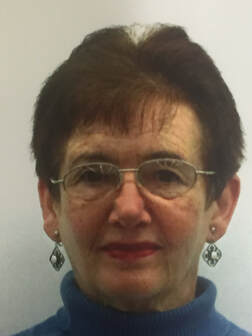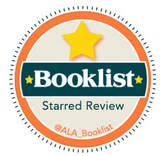 What is the name of the piece that you have in Grabbed? Kidnapped Girls What was the inspiration for your piece? What compelled you to write it? I was inspired by the 2014 kidnapping of school girls in Nigeria by the terrorist group Boko Haram. I thought of the incident described in my poem, and of the book All I Really Need to Know I Learned in Kindergarten, and realized that the facts of life as a female in this world had always been clear to me. When I was in kindergarten, and the neighborhood boys formed gangs to sexually menace girls, this was simply what happened, with none of us kids knowing or questioning why. Luckily, it was harmless, literally only child’s play, but was our game some kind of inborn practice for the future? My grandmother seemed to think so. I saw what happened in Nigeria, what happens all over the world, as the adult version of my childhood experience, and wanted to convey that feeling. I have spent my life wondering, but still don’t know, why we played these games, where the idea came from. My grandmother only wanted to keep girls pure, free from pregnancy and shame, until they could be safely married. I was afraid of her anger as a child, but now saw her power to shout NO to sex in a new light. Saying no could be truly protective, not merely policing, of women. Used for the right purpose, a wrathful voice like Grandma’s could be used to shame rapists and kidnappers and should be. I wanted the force of her sound waves to be able to stop Boko Haram. What compelled you to submit your work for this anthology? Was it a difficult decision? The decision was not at all difficult. I learned of the anthology through my poetry teacher Ellen Bass and was happy to have the opportunity to submit. My poem had previously been accepted, but not yet published, by a wonderful journal which unfortunately had to cease publishing. When I heard of the Grabbed anthology I was excited to think my poem might find another poem there. It seemed like the perfect place. I was also thrilled that Joyce Maynard and my heroine Anita Hill were participating in the book. I was still burning about the Anita Hill hearings and ever will be. Why did you choose this particular form or genre for this piece? My first impulse is usually toward poetry. I like trying to say as much possible with the fewest words. That said, I also like attempting essays. Can you speak to the evolution of writing your piece? How long did it take you to write this piece, including revision? I was asked to do a partial revision by the editor of the journal that first accepted the poem. She helped me with the process. Later, I made a few more changes before submitting it to the anthology. So the whole process took several years, but was not continuous. As a writer, do you feel obliged to share difficult experiences? Why? Yes. Because the sound and light of words are needed to dispel the silence and darkness of secrecy and trauma. My poem in this anthology is more collective than personal in feeling, but I know how hard it can be to share experiences that are traumatic even to think about. Overcoming the resistance to re-experiencing the trauma becomes part of the difficulty of writing. What do you feel the impact of the #MeToo movement has been on your work, if any? The #MeToo movement has been yet another affirmation, and the strongest yet, of the universality of some of my/our experiences and their need to be shared to bring about collective change. I know from experience how long this can take. I read The Second Sex when I was twelve, came of age in the ‘60s, experienced second-wave feminism in the ‘70s, followed by Phyllis Schlafly and the sad recession of the wave, then a resurgence of the wave with the Anita Hill hearings, and now another with this movement. History progresses in waves and although our bodies don’t evolve, culture can. The struggle of women is as old as humanity, in part because for women to be free men must also be free. Unless that’s vice versa! Also, generations are short and much gets forgotten that must be rediscovered to be remembered. And youth thinks differently than age, yet age only makes me feel my youthful thoughts more deeply. If historical movements proceed in waves, participating in one as a writer is like helping to build a cathedral. My or your story may be remembered or it may not. But while it is read it has a chance to affect another life directly, and that is what builds the cathedral. Anyone who wants to tell a MeToo story should find a way to do it. The material will not be wasted. What would you say to another writer who has been uncomfortable or silent about their experience? How can they begin to share their experiences? Joining a writer’s group led by a skilled writer/teacher can be a great way to start sharing experiences safely. The leader should understand the nature of your experiences and the special difficulties of writing about them. All personal experiences are difficult to write about in a way that reaches the reader, but some more than others. Trauma is famous for wishing to stay hidden. If your experiences have been very traumatic, and you have not yet done so, you might also consider seeing a therapist. You can read books like Gregory Orr’s Poetry as Survival, Tillie Olsen’s Silences, Virginia Woolf’s A Room of One’s Own, to name some classics. There are many more. You can journal just for yourself and remember that you are not alone. This becomes evident as soon as you open your mouth. Others join you. But it does take courage to start. It is scary yet a privilege to be able to speak. We are lucky to have more opportunity now than ever before. How can a publication such as Grabbed help to empower or heal readers? By validating readers’ experiences. By showing readers they are part of an already huge and powerful crowd. By giving them permission to keep moving forward. Catherine Gonick’s poetry has appeared in literary magazines including Notre Dame Review, Beltway Poetry Quarterly, Lightwood, Forge, Sukoon, and PoetsArtists, and in anthologies including in plein air, and forthcoming, Poemas Antivirus. She was awarded the Ina Coolbrith Memorial Prize for Poetry and was a finalist in the National Ten-Minute Play Contest with the Actors Theatre of Louisville. She is part of a company that mitigates the effects of climate change.
0 Comments
Leave a Reply. |
Grabbed BlogHave a blog idea for us? Submit it here. Archives
October 2020
Categories |
|
BUY GRABBED
|
If you or anyone you know is a victim of domestic violence, please call The National Domestic Violence Hotline: 1-800-799-7233 1-800-787-3224 (TTY) En Español: 1.800.799.7233 |
 RSS Feed
RSS Feed







